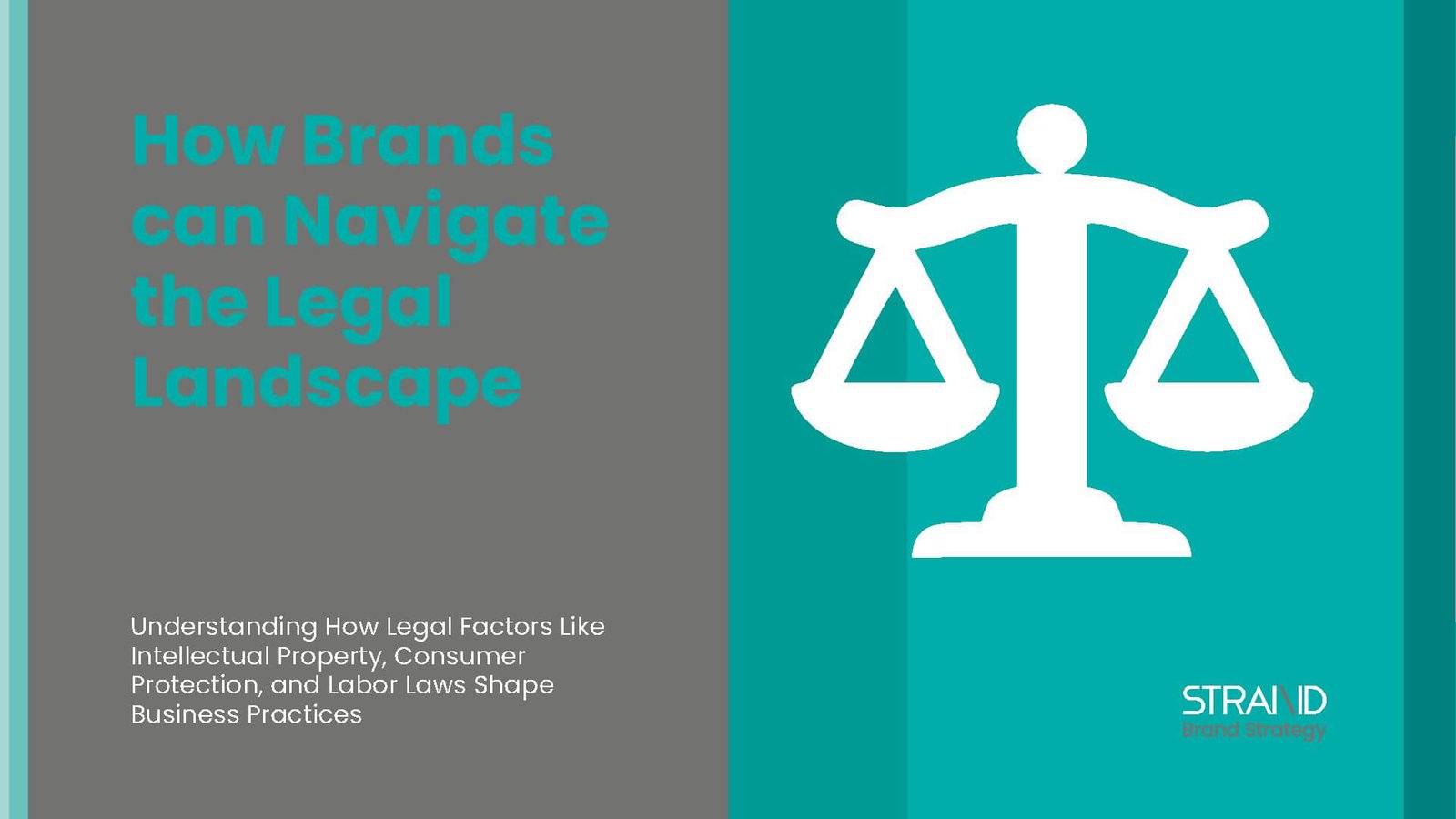How Brands can Navigate the Legal Landscape
8 minutes | 04 Nov 2024Understanding How Legal Factors Like Intellectual Property, Consumer Protection, and Labor Laws Shape Business Practices
In the complex world of business, legal factors play a crucial role in shaping operations, strategies, and decision-making processes. Companies must adhere to a range of laws and regulations, from intellectual property protection to labor standards, ensuring they remain compliant while protecting their interests. Legal frameworks not only provide businesses with guidelines for ethical conduct but also help establish a level playing field for competition.
Failure to comply with these laws can lead to significant financial penalties, reputational damage, and even the closure of a business. In this article, we will explore how various legal aspects—such as intellectual property rights, consumer protection laws, and labor regulations—affect businesses and what companies can do to navigate this complex landscape effectively.
Intellectual Property and Its Influence on Business Strategy
Intellectual property (IP) refers to creations of the mind—such as inventions, designs, symbols, names, and images—that are protected by law. IP laws grant creators exclusive rights to use and benefit from their innovations, preventing others from copying or exploiting them without permission. Patents, trademarks, copyrights, and trade secrets are the primary forms of intellectual property protection.
As technology evolves and industries become more knowledge-based, intellectual property has emerged as a key business asset. Companies are investing heavily in innovation and branding, making the protection of their intellectual property essential for maintaining a competitive edge. The global patent filing system, managed by the World Intellectual Property Organization (WIPO), has seen a rise in patent applications in industries such as technology, pharmaceuticals, and automotive.
Startups and established companies alike must navigate the intricacies of intellectual property laws to protect their innovations and avoid costly legal disputes. Patent trolling—where entities aggressively enforce patent rights to extract settlements—has become a growing concern, especially in industries like software development and telecommunications.
For businesses, safeguarding intellectual property is critical for maintaining market leadership, attracting investors, and generating revenue. By securing patents, companies can prevent competitors from copying their products or processes, allowing them to capitalize on their innovations. Trademarks protect brand identity, ensuring that consumers can distinguish a company’s products from those of its competitors.
On the flip side, businesses must be cautious about infringing on the IP rights of others. Infringement can lead to costly lawsuits, financial penalties, and reputational damage. Companies need to conduct thorough due diligence, ensuring that their products and services do not violate existing patents, trademarks, or copyrights.
Apple and Samsung’s legal battles over smartphone design patents are a notable example of how intellectual property disputes can impact business strategies. Both companies have spent years in court, suing each other over design and technology patents, resulting in billions of dollars in settlements and legal fees. These legal confrontations have influenced product design, marketing strategies, and competitive positioning.
Similarly, the pharmaceutical industry is heavily reliant on patents to protect new drug formulations. Companies like Pfizer and Merck invest billions in research and development, and patent protection allows them to recoup their investments by maintaining exclusivity over new drugs for a certain period.
Consumer Protection Laws and Their Impact on Business
Consumer protection laws are designed to safeguard the rights of consumers and ensure fair trade practices. These laws regulate how companies advertise, sell, and deliver products and services to customers. They protect against fraud, deceptive marketing, defective products, and unfair pricing practices. In many countries, consumer protection agencies are responsible for enforcing these laws and taking action against businesses that violate them.
- Advertising and Marketing Practices:
Consumer protection laws regulate how businesses market their products. Misleading advertising, false claims, and hidden fees are prohibited, and companies must ensure that their marketing materials accurately represent the products or services being sold. The rise of social media and influencer marketing has brought new challenges, with regulators increasingly focusing on transparency in sponsored content. - Product Safety:
Businesses are required to ensure that their products meet safety standards set by regulatory bodies. Unsafe products can lead to recalls, lawsuits, and harm to the company’s reputation. Companies in sectors such as food, pharmaceuticals, and electronics are particularly vulnerable to product safety regulations. - Data Privacy:
With the growing importance of digital business and online transactions, data privacy laws have gained prominence. Regulations like the European Union’s General Data Protection Regulation (GDPR) and the California Consumer Privacy Act (CCPA) mandate that businesses protect customer data and provide transparency about how personal information is collected, stored, and used.
Consumer protection laws pose challenges for businesses that must ensure compliance while still achieving profitability. Non-compliance can result in lawsuits, fines, and a damaged brand reputation. However, businesses that prioritize consumer protection often build stronger customer loyalty and trust, which can be a competitive advantage in the long term.
Companies that adhere to high product safety and transparency standards can differentiate themselves from competitors by promoting their commitment to ethical business practices. Additionally, businesses that are proactive about data privacy can gain the trust of privacy-conscious customers, positioning themselves as leaders in digital security.
Consumer protection laws benefit consumers by ensuring they receive fair treatment, safe products, and transparent services. However, they also impose a burden on businesses, particularly smaller enterprises that may struggle to keep up with evolving regulations. Legal departments and compliance officers play a critical role in helping companies navigate these laws and avoid legal pitfalls.
Volkswagen’s 2015 emissions scandal is a classic example of a company violating consumer protection laws. The company was found to have installed software in its diesel vehicles to cheat emissions tests, leading to lawsuits, fines, and a massive hit to its reputation. This scandal highlights the consequences of deceptive practices and the importance of compliance with regulatory standards.
In contrast, companies like Unilever have built a reputation for ethical practices, transparency, and high product safety standards. Unilever’s focus on sustainability and consumer rights has strengthened its brand and fostered trust with its customer base.
Labor Laws and Their Impact on Workforce Management
Labor laws govern the relationship between employers and employees, covering areas such as minimum wage, working hours, workplace safety, and discrimination. These laws are designed to protect workers’ rights and ensure fair treatment in the workplace.
- Wages and Compensation:
Minimum wage laws set the lowest amount an employer can pay an employee, ensuring workers receive fair compensation for their labor. These laws vary by region and industry, with many countries implementing periodic increases to the minimum wage to account for inflation and cost of living. - Working Conditions:
Labor laws also regulate working hours, overtime pay, and employee breaks to ensure workers are not exploited. In addition, workplace safety regulations, such as those enforced by the Occupational Safety and Health Administration (OSHA) in the U.S., require employers to provide a safe and healthy work environment. - Non-Discrimination and Equality:
Anti-discrimination laws protect employees from unfair treatment based on race, gender, age, disability, or other protected characteristics. Businesses must ensure equal treatment of all employees, both in hiring practices and day-to-day operations. Failure to comply with these laws can result in lawsuits, reputational damage, and financial penalties.
While labor laws protect workers, they can also impose challenges on businesses. Compliance with wage laws, workplace safety regulations, and non-discrimination policies requires continuous monitoring and investment in human resources. However, businesses that foster a positive, fair, and safe working environment often benefit from increased employee satisfaction, productivity, and retention.
Companies that treat their employees fairly are also likely to attract top talent, particularly in competitive industries. By embracing diversity and inclusion initiatives, businesses can enhance their innovation capabilities and strengthen their overall performance.
Labor laws primarily benefit employees by ensuring fair wages, safe working conditions, and protection from discrimination. However, they also impact employers, who must remain compliant with legal requirements. Human resource departments play a key role in managing compliance and fostering positive labor relations.
Amazon has faced scrutiny over its labor practices, particularly concerning warehouse workers’ working conditions and wage policies. While the company has made efforts to improve wages and worker safety, continued criticism has highlighted the challenges of maintaining compliance with labor laws in large-scale operations.
On the other hand, companies like Salesforce have taken proactive measures to ensure compliance with labor laws and promote diversity and inclusion. Salesforce’s commitment to equal pay for equal work has positioned the company as a leader in workplace equality, attracting top talent and earning customer trust.
Legal Compliance as a Cornerstone of Business Success
Laws and regulations—whether related to intellectual property, consumer protection, or labor practices—play a vital role in shaping business strategy. Companies that fail to adhere to these legal requirements risk facing financial penalties, reputational damage, and operational setbacks. However, businesses that prioritize legal compliance and ethical practices can build stronger relationships with consumers, employees, and investors.
In today’s highly regulated business environment, staying informed about legal changes and actively pursuing compliance is essential for long-term success. By embedding legal considerations into their business strategies, companies can not only avoid legal pitfalls but also foster trust, innovation, and growth.
Federal Trade Commission (FTC). “Consumer Protection Laws and Business Compliance.”

